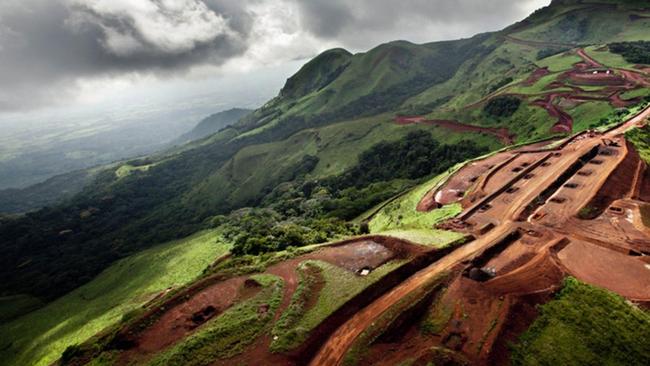Rio Tinto says its has signed off on the legal framework covering the development of Simandou
If Rio decides to go ahead, Simandou in Guinea would reduce China’s reliance on Australia as its biggest source of iron ore.

Rio Tinto has finally signed off on a key development agreement with the Guinean government over the port and rail infrastructure needed to get the giant Simandou iron ore mine in Guinea, West Africa, into production.
Rio late on Friday said it had signed off on the joint venture arrangements with the Guinean government and the China-backed Winning consortium on a “co-development convention”.
The agreement clears the way for an acceleration in the development of Simandou, long lauded as the biggest undeveloped iron ore project in the world.
Early works have already begun on clearing the rail path, and at the port.
While no final investment decision has been made, Rio said in its half-year financial report, delivered in July, it expects to spend about $US500m on work at the project in the second half of the year, after spending $US300m in the first half.
Rio says it expects to make a final decision on its involvement in the project by the end of the year, and will disclose the estimated cost of building the project when it does.
With a mining reserve grading more than 65 per cent iron – and parts of the deposit closing on 67 per cent – Simandou will play a major role in supplying China’s biggest steel producers when the long-stalled mine finally comes into production, helping reduce China’s reliance on Australia as its biggest source of iron ore.
Rio and its Simfer partnership with Chinese state-owned industrial giant Chinalco controls half of the tenements that make up the Simandou deposit, with a Chinese-backed consortium led by Singapore’s Winning International Group the other half.
The Guinean government owns a 15 per cent stake in both the deposit, and the port and rail infrastructure.
While Rio did not give details of the contents of the agreement with the Guinean government, it is understood to set the legal framework for the massive port and rail infrastructure needed to get Simandou’s high-grade ore to Chinese markets – including access rights for third party users of the rail infrastructure, tariff structures covering its use, and taxation and other key principles needed to give Simandou’s developers the confidence to push ahead with the massive project.
Rio said on Friday the agreement would “create the legal framework for the co-development of more than 600km of new multi-use rail together with port facilities, that will be used to export iron ore from the Simandou mining concessions”.
The convention – similar in nature to the state agreements that enabled the development of the Pilbara as an iron ore province in the 1970s – is a major step forward for Simandou’s development, setting out the rights and responsibilities of both the government and the two consortiums sharing the development of the giant project.
While a key step for Rio and Simandou, the deal is not the final step in approving the mine and transport infrastructure – shareholders agreements between Rio and Winning are still under negotiation, Rio said.
The infrastructure convention also needs to be formally ratified by the government of Guinea, Rio said.
But the agreement locks in Rio’s share of the ownership of the port and rail infrastructure servicing the mines, as well as its responsibility to pay a half share of the development costs.
Rio’s side of the giant deposit is owned 15 per cent by the Guinean government, with Rio holding 45 per cent and a Chinalco-led Chinese consortium the rest.
The company said on Friday the new agreement will allow some acceleration of early works at the project.
Rio shares closed down 65c to $109 on Friday.


To join the conversation, please log in. Don't have an account? Register
Join the conversation, you are commenting as Logout